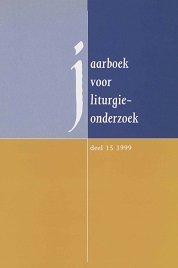Over de betekenis van de eucharistie
Samenvatting
The Eucharist is a remembrance which gives us food for thought. In a sacramental act a past event is presented to our lives, presenting us with reality. The reality that is being presented to us in the Eucharist is believed to be the offering of Christ, and Christ is believed to be really there. This belief, however, does not seem to ‘fit’ into modern thought. The Eucharist as the celebration of a sacrifice is problematic to modern thought: we would prefer to live without sacrifice. And the real presence of Christ in the Eucharist is also strange to modern thought: how can somebody be really present if he is obviously not there? Not many people dare to cross the traditional bridge between faith and thought, the ‘impossible’ transsubstantiation. And although modern, more reliable bridges have been built (transfinalisation or transsignification), the question arises whether the gap between faith and thought must be bridged in order to make sense. In this article a philosopher and a theologian try to rethink the matter of the Eucharist, not by bridging, but by minding the gap. The question of real presence brings us back to the deeper question of being (M. Heidegger). The question of being can only be posed by someone who is there; being is therefore only present in the understanding of Dasein. The being of bread and wine, for instance, appears in our understanding of these things: according to Heidegger bread and wine gather heaven and earth, immortals and mortals. However, in the institution of the Eucharist, Jesus Christ gave this bread and this cup new meaning (a new being) by relating them to His offering. In the offering, the understanding of a being is determined by its presenting role. In the offering the being of this bread and this cup appears as presentation, as a presence. Real presence is being finite and relational. Being there means being aware of one’s own end: not to be there and to be fulfilled in a goal (the word ‘end’ has both meanings). In the end of our life we may find the meaning of life. This meaning, real presence, can only be reached by offering our life, by becoming (!) a mortal being. The offering of God, who redeemed the mortal creation by becoming mortal, is the presupposition of our offering: offering ourselves in order to be present in the light of the Present One (JHWH). If we want to become human beings, we have to become mortal beings. And if we want to be really there, we have to near God (QRB, ‘to approach God’, also mean ‘to offer’). Nearing God is the fundamental meaning of the offering. The presence of Christ is realized in the recognition of Him as the Present One. This recognition, however, presupposes the real presence of human beings. We become real presences by our offering. Therefore, the realization of the offering is necessarily a participation to the one offering of Christ, which is realized in the meal.


